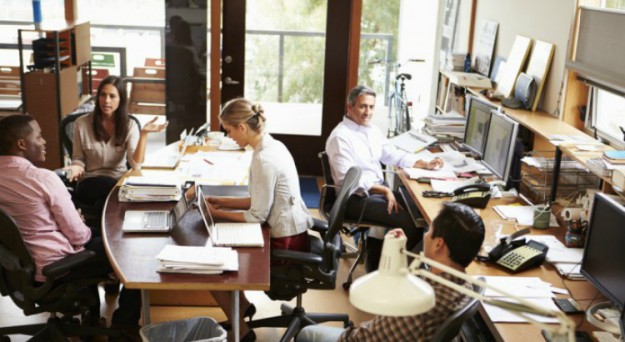How to survive working in an open-plan office?
mis à jour le 14 July 2015 à 18:31Do you find it impossible to sneeze or make a phone call without everyone knowing? Welcome to the wonderful world of offices without partitions. Here are our tricks to work in them without breaking down.
Established in the 1950s by the brothers Schnelle, two German consultants, the open space concept seduced the USA before conquering the rest of the world. Originally a pleasant environment punctuated with house plants and full of good intentions; by bringing down partitions, we destroyed individualism. In reality, it has especially become a way to pile up employees. Some people working in open spaces declare themselves dissatisfied. With no legal obligation, the living space for each individual is not a priority. And in an open space, more than the ideas, noise and smells especially circulate; reflected in the nickname, “Open stress”. Agnès Weiss, consultant and company coach, and Elisabeth Pélegrin-Genel, architect and labour psychologist, provide some advice for coping in such an environment.
ISOLATE YOUR EARS
The open space has the reputation of facilitating networking opportunities, participative debate (less hierarchy, more crosscutting) and fostering positive attitudes. We can talk easily to our boss; moreover, we do not come to work but to burst. “We always sell the open space as a young and fun concept”, explains Alexandre des Isnards, author. In reality, it is not easy to concentrate amid the ambient cacophony (ringtones, pens banging on the table etc.). Without counting the colleague who wants to share the epic tale of his/her weekend… “It is necessary to know how to isolate ourselves by wearing wax ear plugs or headphones”, recommends Agnès Weiss. “It will not be perceived badly if we explain our need to occasionally take refuge at work. Always bring back the problem to your own sensibility rather than accuse the other one”. Furthermore, it is OK to suggest that your chattier colleagues make conference calls in a meeting room!
MAKE A LIST OF POSSIBLE IMPROVEMENTS
Real estate - especially in Singapore - is so expensive that it is impossible not to think of the open concept office where collaborators are aligned on large tables. We have to cohabit with those who are sensitive to strip lighting,freezing AC temperatures , and so on. Certainly, we cannot mark our territory, but we can personalise our desktop wallpaper and bring in Feng Shui figurines. And if we are allocated a workstation in the worst corner (near the toilets or beneath the air-con vent), it is necessary to speak up and discuss improvements with the manager. “The group can meet to list the desired changes (new blind, anti-reflection screen, etc.). Each will speak about his/her issues and it will then be easier to mention what disturbs them”, explains the psychologist Elisabeth Pélegrin-Genel. A manager will not turn a blind eye in front of concrete proposals validated by the team.
DEAL WITH THE PARANOIA
Those who are converted to the concept defend “the harmonious and creative cooperation”, favoured by the open-plan structure. With the manager in the middle, breathing energy and team spirit, the problem is that free circulation of ideas means also the free circulation of hostility. Each spies on the screen of the other, not deliberately, just to see if he/she is working or updating Facebook. All of us has a naughty side. If we tidy away our things at 6pm, 30 pairs of eyes look at us, even if we arrived at 8am (nobody was there to see it). “The surveillance and competitive atmosphere between employees do not promote productivity or creativity, rather they are countered”, underlines Agnès Weiss. It remains only to equip ourselves, with humour, to fight against the paranoia; for example, with the Cubicle Survival Kit “Special open space” launched in 2002 by a young American. It contains, among other things, a sign that reads “Come back later” and a rear-view mirror. We can be inspired by it to create our own kit.
Maureen Diament




